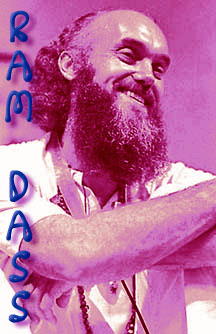
| MAIN BIOGRAPHIES |
|
Nelson Algren |
|
Neal Cassady |
|
Raymond Chandler |
|
Edward Dahlberg |
|
William Browning Spencer |
|
Olaf Stapledon |
|
Alan Turing |
|
Emiliano Zapata |
|
|

photo courtesy and ©
Robert Altman
used with permission
RICHARD ALPERT
Biographical Notes:
Richard Alpert was born 6 April in 1928, 1931, or 1933, (depending on whom you believe) in Boston, Massachusetts.
First takes psilocybin in 1961 with Timothy Leary . Becomes an integral part in the Harvard Psilocybin Project. Works with Leary and Ralph Metzner to rewrite the Tibetan Book of the Dead as The Psychedelic Experience . The intention is to provide a manual which will serve to establish an appropriate "setting" for the experience of such drugs as LSD , psilocybin, mescaline and DMT .
Dismissed from Harvard with Leary in 1963. Involved with the Zihuatanejo Project, the IFIF ( The International Foundation for Internal Freedom ) and the Castalia Organization at Millbrook, all of which were attempts to realize a psychedelic utopia as presented in Island by Aldous Huxley , and Glass Bead Game by Herman Hesse .
Disillusioned with the failure of these utopist projects, he travels to India in 1967 and encounters his spiritual teacher, Neem Karoli Baba. Alpert receives the name Ram Dass, or "servant of God". Returns to the United States to pursue his sadhana, or "spiritual journey".
In 1974, Ram Dass creates the Hanuman Foundation. Co-founds the Seva Foundation ("service," in Sanskrit) in 1978, an international organization dedicated to relieving suffering in the world.
On 19 February 1997, Ram Dass suffered a stroke which left him paralyzed of the right side of his body and limited his ability to speak. He is still said to have his memory intact and is able to understand what is said to him. For more information, see the link below.
From the Updates on Ram Dass's condition after the stroke:
The latest issue of "Utne Reader" has a little column about Ram Dass and tells about him waving his left arm in the air and saying, "Finally! The Sound of One Hands' Clapping!" Phone conversations and visits with friends are helping Ram Dass practice speaking so words are coming much more fluently to him. He's been getting out more; to the store, to the bank, visiting with friends; all the little steps in returning to Living.
Please see:
www.openmindopenheart.org/UnityArden/RamDass.html
for current updates.
Quotes
"I had plenty of LSD, but why take it. I knew what it was going to do, what it was going to tell me. It was going to show me that garden again and then I was going to be cast out and that was it. And I never could quite stay."
"When you say, "I can't comprehend it," it's because the thinking mechanism you have works with time- so time and space are the matrices against which you think. The predicament of dimensions which are not linear- not linear time or linear space- where here and now are both here, and now and then are both now- those are ones we can't thinkabout."
"I don't have a model. All I can see is that I am a teacher and as a teacher you collect more. You see, the peculiar predicament that I'm in is that I go back to the feet of this little old man in a blanket and I'm in the relation to the guru of chela. It's his trip, not mine anymore. I am in the role of service."
Bibliography
-
LSD, Richard Alpert, Sidney Cohen
-
Be Here Now
-
The Psychedelic Experience: A Manual Based On the Tibetan Book of the Dead
-
Between Heaven and Earth: Recipes for Living and Loving, Ram Dass Laura Archera Huxley
-
Conscious Aging : On the Nature of Change and Facing Death/Audio Cassette
-
Dhammapada : The Sayings of the Buddha, Ram Dass, Thomas Byron
-
Experiments in Truth /Audio Cassette
-
Finding and Exploring Your Spiritual Path : An Exploration of the Pleasures and Perils of Seeking Personal Enlightenment/Audio Cassette
-
Grist for the Mill
-
How Can I Help: Stories and Reflections on Servicel, Ram Dass, Paul Gorman
-
How Can I Help, Ram Dass, Paul Gorman/Audio Cassette
-
Journey of Awakening : A Meditator's Guidebook
-
Journey of Awakening : A Meditator's Guide/Audio Cassette
-
The Meditative Mind : Varieties of Meditative Experience, Ram Dass, Daniel Goleman
-
The Only Dance There Is
-
Path of Service : Here and Now in 90S/Audio Cassette
-
Ramayana, Ram Dass, William Buckley/Audio Cassette
-
Sacred Odyssey : Seeking Freedom & Helping Yourself
-
Spiritual Practices & Perspectives for Daily Life
-
Chord of Love/Audio CD
-
Compassion in Action, Ram Dass, Mirabai Bush/Audio Cassette
-
Cultivating the Heart of Compassion/Audio Cassette
-
Helping Yourself With Ram Dass/Audio Cassette
-
Miracle of Love
-
Spiritual Awakening/Audio Cassette
-
Still Here : Embracing Aging, Changing, and Dying
-
Still Here : Embracing Time, Change, and Age/Audio Cassette
-
Compassion in Action : Setting Out on the Path of Service, Ram Dass, Mirabai Bush
-
Death and Dying/Audio Cassette
-
Healing Ourselves : Healing the World/Audio Cassette
-
Miracle of love : stories about Neem Karoli Baba
Filmography
-
A Change of Heart(1994) VHS
Links
-
Robert Altman Photography: collection of photos of the 60's and later, candid portraits of many of the personalities and events of the time.
Author: Bonesy Jones